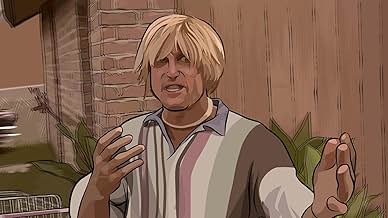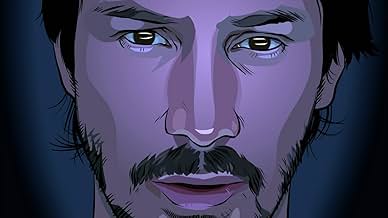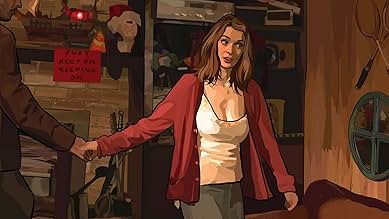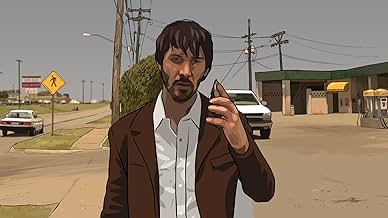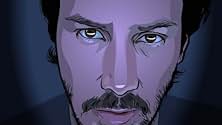A Scanner Darkly
- 2006
- Tous publics
- 1h 40m
An undercover cop in a not-too-distant future becomes involved with a dangerous new drug and begins to lose his own identity as a result.An undercover cop in a not-too-distant future becomes involved with a dangerous new drug and begins to lose his own identity as a result.An undercover cop in a not-too-distant future becomes involved with a dangerous new drug and begins to lose his own identity as a result.
- Director
- Writers
- Stars
- Awards
- 4 wins & 21 nominations total
- Waitress
- (as Natasha Valdez)
- Director
- Writers
- All cast & crew
- Production, box office & more at IMDbPro
Featured reviews
For those who haven't read the book, it's important to know what you're getting into. PK Dick wrote this novel as a way of telling the story of how he and his friends in the early '70s damaged and destroyed themselves with drugs. He tells this story within the framework of a surreal science fiction thriller, but many of the scenes are straight from his own experiences with the unpleasant consequences of people using drugs and disintegrating mentally.
This film does an amazing job of capturing the feel and tone of the book as well as the paranoia, perceptual distortions, and chaos of hallucinogenic overindulgence. Add to that a story that only gradually emerges from the madness, but by the end brings in a lot of heavy ideas such as the existence of free will, whether ends justify means, etc. There is a sense of consequence to what happens in the film, a sense of despair at what has been lost. So this story of drug-addled losers becomes the story of the human struggle for identity and meaning.
I have a couple of minor quibbles regarding scenes from the book that only partially made the cut (no explanation for the significance of "If I'd known it was harmless I would have killed it myself, no little kid to explain how 6 and 3 gears means 18 speeds). Still, most adaptations of PK Dick stories take a few basic ideas and try to shape them into more conventional films that fit into established genres. Even when it works, such as with Blade Runner or Total Recall, it's not really PK Dick. Not so this film. This is PK in all his dark and perverse and deeply thoughtful glory.
Enter "A Scanner Darkly", aside from the Interpolative Rotoscoping that the film maker used to put the graphical images of this movie together and give it an amazing visual feel all its own, the vision and imagery conveyed by the film are as true to Dick's original as any movie has come. I left the theater feeling overwhelmed, touched, and changed, much the same way as when I'd finished the book. This is rare, and it is decidedly a beautiful thing.
I had reasonably high hopes for this film but also the fear I have when anyone takes on material that some have called "unfilmable". Written at a time when his marriage had broken down and he himself was struggling with his drug use and split identities, Dick's material does offer much of interest as long as it can be delivered in such a way to be engaging and interesting. "Making sense" was not one of the qualities I really needed, which was just as well since narratively there isn't a lot to follow along with. Parts of it are funny, parts of it are trippy and parts of it are dramatic. However none of them really come together to produce anything of that much value. It is a shame that the ideas over identity, drugs and the morals of the war on drugs are not better played out. As it is I didn't think there was enough of interest and, with the narrative being so basic, what remained was surprisingly dull.
The use of the rotoscoping was a smart move and also serves as an interesting hook for multiplex audience (and I include myself therein, so it is not a snobbish reference) that have perhaps not seen it before. Linklater produces some good effects this way and it is hard to think of another approach working as well within the context of the material as it does. Sadly this is not enough to carry the film along, although it will be enough to satisfy some sections of the audience. The cast do the best they can within this unsuccessful mix and most of them are individually good here and there. Reeves is a natural stoner but he doesn't convince with his breakdown and confusion that well; he isn't helped by the lack of focus in the script but he can't lift it regardless. Downey Jr is very funny and convincing and wards off the boredom when he is near. Harrelson tries to follow suit but with a dumber character he just falls flat. Cochrane is more enjoyable and the animation really aids his performance. Ryder is OK but she has too much of the narrative to carry and she cannot do it.
Overall this is an OK film at best. It is sporadically interesting, funny and engaging however it cannot find any consistency of tone, pace or engagement. The material is good enough to throw up interesting ideas and themes but Linklater sadly doesn't manage to do much with them across the film. The use of animation over the film cells is really well crafted and works well to support the material it is just a shame then that the awareness and control that Linklater in this area he seems to lack in others.
Linklater and Dick are a perfect match.
The story is about a deep-cover narcotics officer (Reeves) who is in danger of becoming one of his own targets, since he has become addicted to a very popular and addictive hallucinogen - Substance D (AKA "Death") The cast is all very good, and extremely well suited for their characters. But here again, we are seeing Linklater's interpretation of the novel. He saw the comedic potential for the Barris character and played it up by giving the role to Downey and presenting Harrelson as a combination of loyal side-kick and straight-man to Downey's sometimes overpowering Barris.
What the story is really about is the culture of recreational drug use and addiction. Its portrayal of this is on target, and though the subject is treated with some sympathy, the contradictory messages, denials, and complex rationalizations permeating that culture also come through powerfully. In this manner, the film nails the book spot-on.
Reeves is perfectly cast as Arctur. His subtle and somewhat detached style is exactly what was needed for this complex and sympathetic character. And although some have stated that he was "blown off the screen by Downey and Harrelson" I couldn't agree less. Downey is louder and more domineering, yes, but Arctur is not a loud, ultra-dynamic, paranoid, and could not be played in a way which could compete with Downey's character.
Although I believe Winona Rider to be very talented, I had my doubts about her in the role of Donna - one of my favorite characters in Dick's novel. However, once again, Winona exceeded my expectations. I have never seen a bad performance out of her.
This is great casting, period.
While these are not criticisms, I feel obligated to make a couple of comments comparing the book and the film. First, the film is not really as dark and disturbing as the book. I can not explain why in this review - you will have to see it to understand why I say this. Second, I was very slightly disappointed by the reduced role of Donna in this film. Third - though some have commented that the film was hard to follow and that they felt they could only really get it if they read the book - I can only say that this is probably intentional. Yes, many of Linklater's films are non-linear and can be hard to follow for those who expect to have things explained to them. Linklater is, if nothing else, an artist and doesn't seem very interested in linearity or explanation. And the original work by Dick is no less ambiguous. In fact it is, in my opinion, more ambiguous.
This film does a great job of bringing to the screen one of the most intelligent and emotional works of science fiction ever written. My thanks to all involved.
Did you know
- TriviaRobert Downey, Jr. wrote most of his lines down on post-it notes and scattered them around the set so he could read off them while filming a scene. The rotoscoping team simply animated over the notes to remove them from the film during post-production.
- GoofsWhile showing the monitoring equipment, Hank tells Fred that he could be anyone from Arctor's circle of friends, including Barris. This made sense in the book, however, by this time in the movie Hank has already seen Fred alongside Barris, so he could not possibly think they are the same person.
- Quotes
Fred: [voiceover] What does a scanner see? Into the head? Down into the heart? Does it see into me? Into us? Clearly or darkly? I hope it sees clearly because I can't any longer see into myself. I see only murk. I hope for everyone's sake the scanners do better, because if the scanner sees only darkly the way I do, then I'm cursed and cursed again.
- Crazy creditsThe "Phil" mentioned in the "in memoriam" list as having permanent pancreatic damage is Philip K. Dick himself.
- SoundtracksFog
Written by Thom Yorke (as Thomas Yorke), Phil Selway (as Philip Selway), Jonny Greenwood (as Jonathan Greenwood),
Colin Greenwood and Ed O'Brien (as Edward O'Brien)
Performed by Radiohead
Courtesy of Capitol Records
Under licence from EMI Film & Television Music
Details
- Release date
- Country of origin
- Official site
- Language
- Also known as
- Una mirada a la oscuridad
- Filming locations
- Production companies
- See more company credits at IMDbPro
Box office
- Budget
- $8,700,000 (estimated)
- Gross US & Canada
- $5,501,616
- Opening weekend US & Canada
- $391,672
- Jul 9, 2006
- Gross worldwide
- $7,660,857
- Runtime1 hour 40 minutes
- Color
- Sound mix
- Aspect ratio
- 1.85 : 1
Contribute to this page




